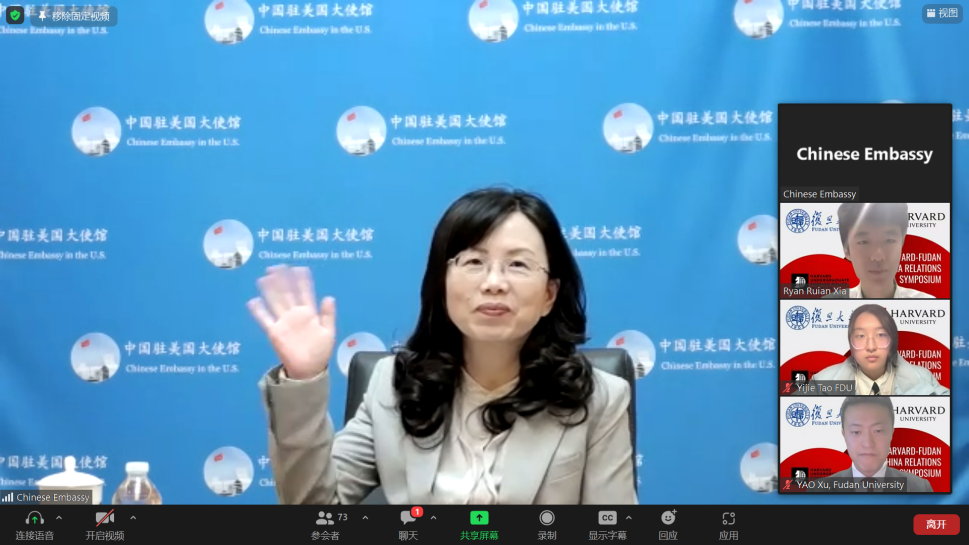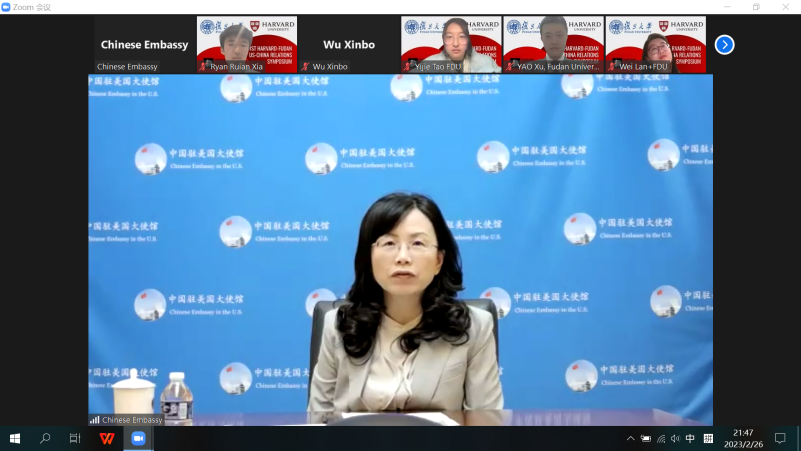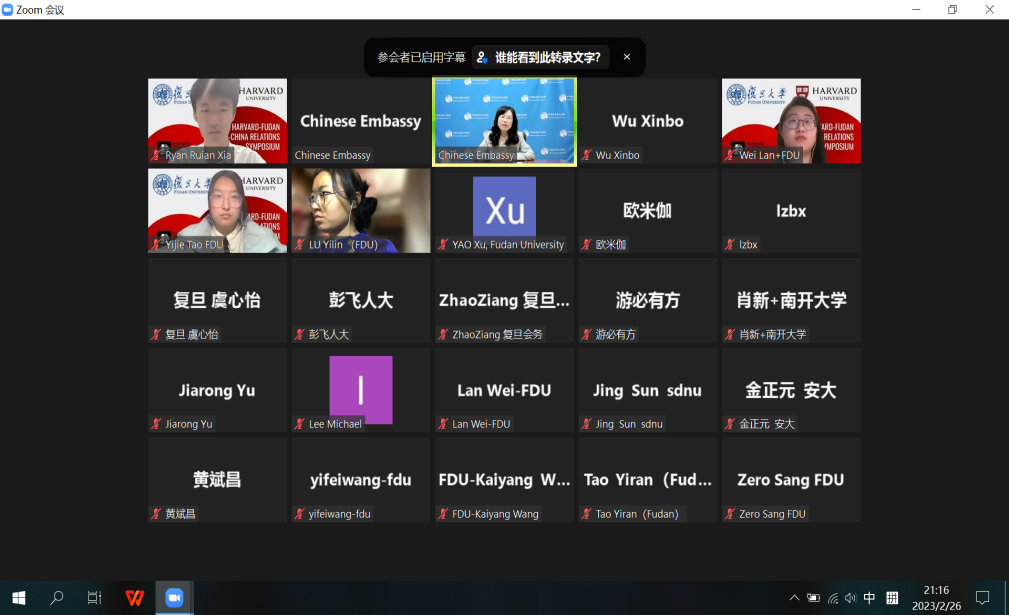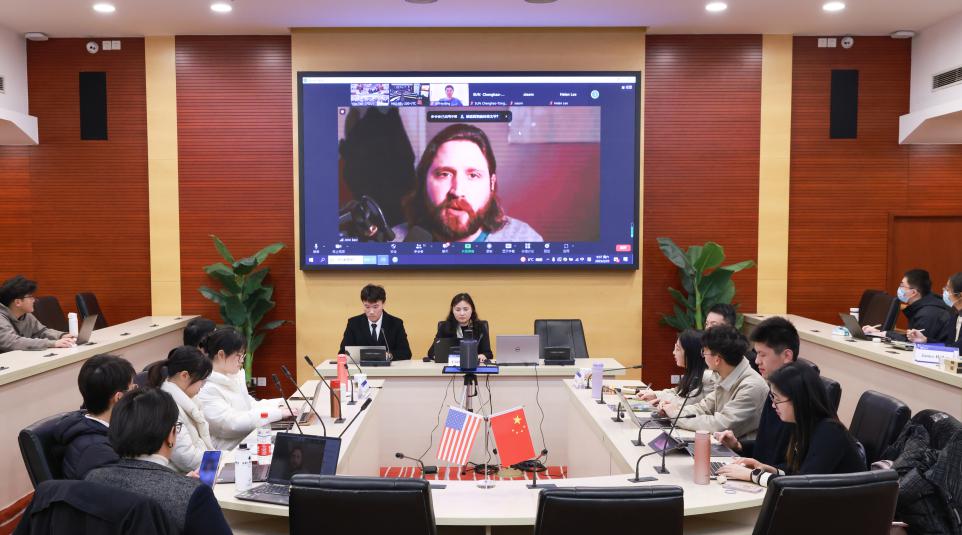 中文
中文
On February 26th, Chargé d'Affaires of the Chinese Embassy in the United States, Madam Xu Xueyuan was invited to deliver a keynote speech (full text here) at the Final Conference of the First Fudan-Harvard China-U.S. Young Leaders Dialogue. The conference is co-organized by the Center for American Studies, Fudan University and Harvard Undergraduate Foreign Policy Initiative, and attended by almost 100 students from Fudan, Harvard and Peking University, etc.

In her keynote speech, Xu said that the dialogue focuses on AI, Internet, Space and biotech, which are important topics critical to the world’s future. This global perspective and future-orientation are required in handling the China-U.S. relationship.The young generation is the future of the two countries and front runners of bilateral people-to-people exchange. To play a critical role in the future China-U.S. relationship, young people need a global vision and a future-oriented mindset. It also means that the young generation of China and the U.S. need to understand more and partner with each other.
Xu proposed four qualities for the students of both sides. First, broad-mindedness. Be willing to recognize and even appreciate mutual difference. Difference brings diversity. The world is as diverse as it is beautiful. China and the U.S. should view their difference with a fair mind, instead of insisting on sameness. For example, the U.S. has the American-style democracy, while China has its whole-process, Chinese democracy. The two sides could learn from each other.
Second, curiosity. Be willing to learn more about each other. Young people have an inquisitive, open mind, and refuse to be confined by conventions, and would like to explore new frontiers. It is important that our two countries strengthen educational cooperation, especially to encourage American students to explore China, a country both old and young.
Third, empathy. Be more understanding toward each other. Peace, development, fairness, justice, democracy and freedom — these are shared values of all humanity, including the Chinese and the Americans. In China, the approach to human rights has its origin in the cultural tradition that values prosperity and harmony for all. We believe that all countries can become partners and friends. China does not bully or bring war to others.
Fourth, aspiration. It means taking up one’s responsibilities to humanity’s future. When someone attempt to define China-U.S. relationship by competition, we should speak up about the mutually beneficial nature of such cooperation. After all, our two countries have broad common interests and share major responsibilities. In addition, we must take actions, and with greater courage and enthusiasm, promote two-way educational, scientific and cultural interactions. That will bring our peoples closer, enable us to know more about and learn from each other. With the two peoples becoming friends, the bilateral relationship will enjoy a stronger social basis.


Xu refered to the recent incident around a wandering Chinese balloon accidentally drifted into the U.S. to emphasize that, whether or not our two countries can properly handle the bilateral relationship bears on the future of our world. It is a question of the century that our two countries must answer well. President Xi Jinping has made important observations about this relationship, which provided us the key to handle it well:
First, history is a fair judge. China-U.S. relationship must develop well and not be mishandled. This is not an optional choice but a compulsory question.
Second, China-U.S. cooperation benefits both sides and beyond; while their confrontation harms both and the rest of the world.
Third, China-U.S. relations should not be a zero-sum game where one side out-competes or thrives at the expense of the other. The success of China and the United States are opportunities, not challenges, for each other.
Fourth, the world is big enough for the two countries to develop themselves and prosper together.
Xu pointed out that, when we follow the strategic guidance of our leaders and work together in the same direction, we will find the way to get along and promote world peace and prosperity. This won’t be easy. It requires concerted efforts by all sectors of the two societies, and in particular, the active participation of the young generation. I hope and believe, the students of our two countries can use this platform to expand communication, thus adding more fresh impetus and greater momentum to the friendship between our two countries.

Xu also answered questions which the students raised on traditional and social media causing ‘Information Cocoons’ and ‘Dark Forest Effect’, etc. In the two days’ conference, the participants discussed frontier technologies, such as AI, Internet, Space and biotech, and their possible influence on the China-U.S. relationship.